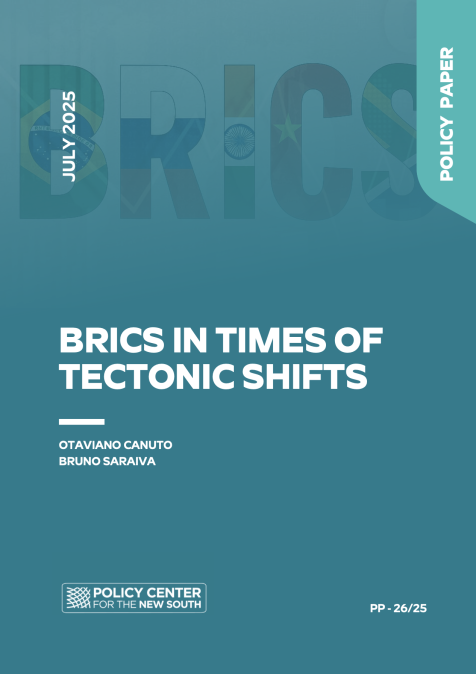Alors que l’ordre mondial bascule vers un système multipolaire, l’Afrique se trouve face à un tournant décisif. Comment éviter la marginalisation et tirer parti de ses atouts stratégiques ? Entre partenariats concurrentiels des grandes puissances, montée du Sud global et élargissement des BRICS, le continent doit trouver un équilibre entre autonomie stratégique et intégration dans de nouvelles alliances. Cet épisode met en lumière les stratégies politiques et diplomatiques qui permettraient à l’Afrique de renforcer sa voix dans les grandes négociations internationales, qu’il s’agisse de climat, de sécurité ou de gouvernance numérique.
RELATED CONTENT
-
AuthorsFebruary 13, 2026Le 27 janvier 2026, le gouvernement espagnol a adopté par décret royal une mesure de régularisation extraordinaire visant les personnes en situation administrative irrégulière ou engagées dans une procédure de protection internationale. Le choix du décret royal permet une mise en œuvre rapide de la mesure, sans passage par un débat parlementaire, dans un contexte politique fortement polarisé sur les questions migratoires.La régularisation concerne les personnes pouvant justifier d’u ...
-
 AuthorsSofia FormigliFebruary 13, 2026There is a story told by Václav Havel, the Czech dissident writer who later became president after the fall of communism. In his essay The Power of the Powerless, Havel describes a shopkeeper who, every morning, places a sign in his window reading: “Workers of the world, unite!” He does not believe in it. Nor do the people around him. Yet the sign remains. ...
AuthorsSofia FormigliFebruary 13, 2026There is a story told by Václav Havel, the Czech dissident writer who later became president after the fall of communism. In his essay The Power of the Powerless, Havel describes a shopkeeper who, every morning, places a sign in his window reading: “Workers of the world, unite!” He does not believe in it. Nor do the people around him. Yet the sign remains. ... -
AuthorsFebruary 11, 2026The U.S.–China technological rivalry has become a central axis of global economic and geopolitical competition. While the United States continues to lead in frontier innovation—most notably in advanced semiconductors and artificial intelligence (AI)—China has consolidated strengths in large-scale implementation, manufacturing capacity, and control over critical segments of global supply chains. These advantages are especially visible in clean energy technologies and in the processin ...
-
AuthorsFebruary 4, 2026This article examines the quiet but profound implications of the erosion of U.S.-led hegemony for small and vulnerable states of the New South. While the post-1945 international order was never egalitarian, it offered predictability: power was organized through law, and sovereignty for weaker states rested less on justice than on procedural stability. Davos 2026 marked a turning point in the public acknowledgment of that system’s unraveling. Statements by leading Western figures rev ...
-
AuthorsFebruary 3, 2026From the use of tariffs as a foreign policy instrument, to the weaponization of critical resources, and from targeted sanctions to attacks on critical infrastructure, economic security is at the forefront of international debates. The aggressive use of economic instruments for strategic purposes has become an explicit feature of international affairs, in a way not seen since the interwar period[1]. Beyond the weaponization of resources of all kinds, an increasing ‘monetization’ is u ...
-
AuthorsJanuary 2, 2026Ce Policy Paper analyse les enjeux politiques, économiques et opérationnels du Fonds pour les pertes et dommages, créé pour répondre aux impacts climatiques irréversibles subis par les pays les plus vulnérables. Il clarifie d’abord la notion de pertes et dommages, qui mêle effets économiques et non économiques, et souligne les défis d’attribution liés à la superposition entre chocs climatiques et fragilités structurelles. L’analyse met ensuite en lumière les tensions d’économie poli ...
-
Otaviano Canuto & Alae JellalDecember 05, 2025This episode examines the current dynamics of de-dollarization and why the global shift away from the U.S. dollar remains slow and partial. Otaviano Canuto highlights how strong structura ...
-
AuthorsNovember 25, 2025This Policy Paper analyses the Fourth Industrial Revolution (4IR) through the critical lens of technological colonialism. It argues that the fusion of physical, digital, and biological technologies is not merely a technical phenomenon but a civilizational shift reshaping the foundations of global power. The article traces a historical continuum from previous industrial revolutions, demonstrating how patterns of inequality and extraction persist, now transposed into the digital realm ...
-
August 28, 2025Alors que l’ordre mondial bascule vers un système multipolaire, l’Afrique se trouve face à un tournant décisif. Comment éviter la marginalisation et tirer parti de ses atouts stratégiques ? Entre partenariats concurrentiels des grandes puissances, montée du Sud global et élargissement d...
-
AuthorsBruno SaraivaJuly 21, 2025This article assesses the economic performance of the original BRICS economies, relative to the growth and currency appreciation projections presented in the papers that introduced the acronym, prior to the grouping becoming a diplomatic, political, and economic reality. It also discusses the BRICS agenda in the current challenging geopolitical context, in which economic fragmentation tends to raise costs for the global economy and presents considerable obstacles for emerging and de ...










